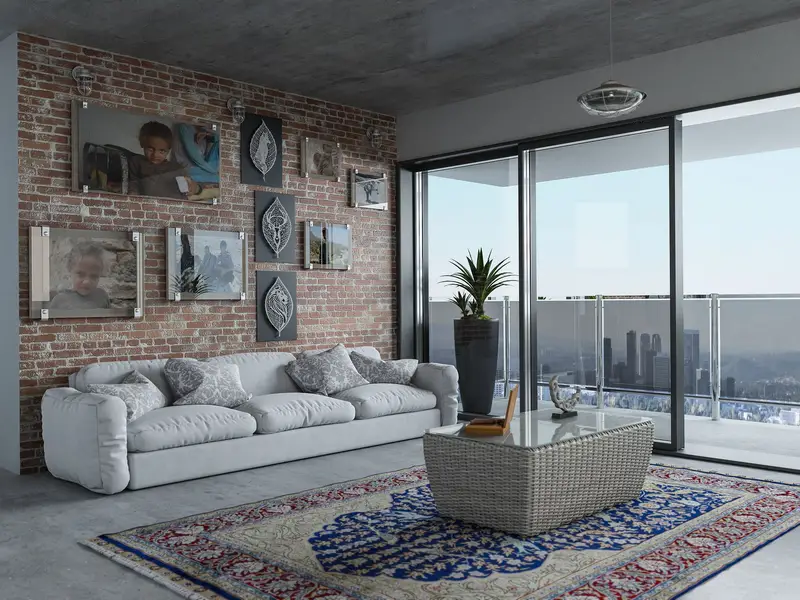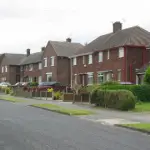
You may be buying your first property, and this may be a flat or a house when you discover it’s a leasehold property. Leasehold properties are different to freehold properties and leasehold property can be harder to sell too, which is why it is important to understand the disadvantages of buying leasehold property.
The main disadvantages of buying leasehold property include paying service charges and ground rents, which you have no control over and can be very costly. But also, owners of leasehold property are often governed by many restrictive covenants and will need permission to extend or make alterations.
Please also read this article to discover how you could save £71,475 on your next mortgage if you sell your house and rent before buying again. Even I was amazed when I did the calculations! The strategies you learn in this article will not only save you money, but it will also reduce the stress of buying your next house.
The disadvantages of leasehold property
- Expensive service charges.
- Costly ground rents.
- At the behest of the management agent.
- Bad management companies.
- Written permissions needed to make changes.
- Restrictive covenants.
- Pets are often not allowed.
- Prevented from running a business from home.
- Sub-letting restrictions.
- Additional fees to sublet.
- Lease agreement is a fixed period.
- Leases of less than 80 years can be harder to sell and reduce in value.
- Leases of less than 70 years may not be mortgageable.
- It will cost to increase the lease term.
- Conveyancing fees are often higher.
- Sale fees.
- Shared front entrance.
- Serviced accommodation restriction.
- Imminent major works and costs.
- Living in close proximity to other owners.
- Little or no outside space or garden.
- Be aware of a legal fee backfire!
Now let’s take a look at each of these disadvantages of leasehold property in more detail.
1. Leaseholders pay service charges
Most owners of leasehold properties have to pay service charges to the freeholder for the upkeep and repair of the building and common areas, including the roof, lifts, the garden and the car park.
Service charges can be costly, and the leaseholder has no control over the level of the charge, which means if the freeholder decides to spend money on upgrading the building, each leaseholder doesn’t have much of a say in what is spent.
Also, a part of your service charge can be set aside into a sinking fund, which is a pot of money set aside for future works.
But not all leasehold properties have a sinking fund, which could mean you buy a leasehold property that requires major works and you could end up sharing this cost with other owners who have lived there for many years.
The service charges have to be fair and reasonable, which means leaseholders can dispute any charges they think are unfair at a tribunal. But the sector is completely unregulated, and means it can be difficult to challenge any rogue management agent or freeholder.
2. Leaseholders pay ground rents
Most leasehold properties have ground rents to pay, and the level of ground rent and how the charge is increased each year is included in the lease agreement.
There are horror stories about how some ground rents double every few years, which can make the leasehold property unsaleable and unmortgageable.
3. Leaseholders are at the behest of the management agent
Most of the management agents I’ve had the misfortune of dealing with don’t care about the leaseholders. The customer of the leasehold management company is the freeholder, and not the leaseholder. This means they don’t have to treat you nicely.
Which means their customer service is often pretty non-existent, as they don’t really have to please the leaseholder, and as long as the management agent does the job of collecting ground rents and service charges, the freeholder is happy.
The fact that many leaseholders might be unhappy is often times irrelevant to the freeholder.
4. Bad management companies can badly affect leasehold properties
If the freeholder appoints a bad management agent who doesn’t keep the building and gardens to a good standard, this will affect the value and saleability of the flats or apartments in the building.
5. Leaseholders require written permission to refurbish or extend
Written into the lease on most leasehold properties is the need for permission from the freeholder to carry out any major works to the property. This would include major refurbishment or extensions, but in most cases it will be difficult to put an extension on a leasehold flat in any event.
6. Many leasehold properties have restrictive covenants
The lease agreement for leasehold property will often include certain restrictive covenants that prevent the owner from doing certain things.
This can include not being allowed to have pets, preventing the owner from running a business from home or from letting the property out using Airbnb as serviced accommodation.
7. Pets are often not allowed in leasehold property
Owners of leasehold property are often not allowed to have pets like dogs and cats. This means there are less buyers who will buy a leasehold property, as many homeowners have pets.
8. Some leasehold properties prevent owners from running a business from home
Some lease agreements on leasehold property include a covenant that prevent the owner from running a business from home. This may give homeowners a problem who need to work from home as a result of the Covid-19 pandemic.
The best thing I suggest is you have your conveyancing solicitor to check the lease agreement.
9. Subletting restrictions on some leasehold properties
Many leasehold agreements have a sub-letting clause in the lease, which can stop the owner from sub-letting the property.
This will stop an investor from renting the property to tenants, which will limit the marketability of the property, as property investors will not buy properties with a restrictive subletting clause that prevents them from letting to tenants.
10. Some lease agreements include additional fees to sublet
The subletting of leasehold property may include a clause that means the owner has to pay a subletting fee to the freeholder if they want to rent the property to tenants.
11. Lease agreement is a fixed period
The lease agreement on leasehold property is for a fixed period and each year the remaining term on the lease reduces. Once the remaining term falls to 80 years or below, the property will be harder to sell. A lease term below 70 years will make it almost impossible to mortgage or remortgage.
12. Leases of less than 80 years can be harder to sell and will reduce in value
Leasehold property with a remaining lease term of 80 years or less will be more difficult to sell. As the lease term reduces below 80 years it will cost more to extend the lease term, as the cost of extending the lease will include its marriage value*. The market value of the leasehold property will also reduce as the lease term reduces.
* For more about marriage value and some examples of how this may affect the cost to extend a lease term, please visit this article: Why Would Anyone Buy A Leasehold Property. This link jumps to the section in the article that discusses marriage value.
13. Leases of less than 70 years may not be mortgageable
Shorter leases of 70 years or less make it difficult to get a mortgage or to remortgage, which means unless you are a cash buyer you may not be able to buy the leasehold property.
Also, a leasehold property with a lease term remaining of 70 years or less will reduce in value and will be very difficult to sell.
14. It will cost to increase the lease term on leasehold property
If the lease term needs to be extended this can be expensive, and the shorter the lease term the more expensive it will be.
For example, to extend a lease term by 90 years if it has 90 years remaining will cost around £9,000, but a lease that has only 60 years remaining can cost in excess of £30,000 to extend for another 90 years.
15. Conveyancing fees are often higher on leasehold property
The conveyancing fees on leasehold property are often higher as the solicitor has to check the lease agreement, which is something not required when you buy freehold property.
16. Leasehold property often have sale fees
The freeholder will often charge sale fees to answer questions from the buyer’s conveyancing solicitor, which will add to the cost of selling a leasehold property.
As most leasehold properties are flats and apartments, they have a shared entrance, which can make your property less secure. All flat owners will have a key to the main entrance, which arguably makes it less safe.
18. Leasehold properties have serviced accommodation restrictions
If you would like to rent your property as serviced accommodation with the likes of Airbnb, you will need to check the lease, as often times the lease agreement will prevent owners from letting the property as serviced accommodation.
19. Imminent major works and costs
Many leasehold properties don’t have a sinking fund in place to cover for the cost of future major works. As a result you could be unfortunate to buy a leasehold property that is in need of major works and receive a service charge demand for your share of these costs.
This problem has been highlighted as a result of the Grenfell fire in London and with new legislation making it law for blocks of flats to change the cladding t a safer fire resistant cladding. Having just received my first management charges to pay for the cladding works at my investment property in Manchester, this disadvantage is all too raw for me.
So before you buy a leasehold property, make sure your solicitor checks with the freeholder and management company about the sinking fund, and for any up-coming major works and costs.
20. Living in close proximity to other owners
A disadvantage of buying leasehold property to some would be the fact of living in close proximity to other owners in a block of flats. This can make it noisy, as you could have people living next to you and above and below you with some flats.
But having said that, most modern flats should have sufficient soundproofing to prevent to my noise from neighbours.
21. Little or no outside space or garden
One major disadvantage of buying leasehold property is you’ll have very little outside space and in most cases you won’t have a garden. But some leasehold flats on the ground floor come with a small private garden, but this is very rare.
On the other side of this coin is an advantage for those who don’t like gardening, as the gardens are the responsibility of the management company and are tended to by gardeners.
22. Be aware of the legal fee backfire disadvantage
Whilst there is legal provision for leaseholders to challenge service charges for fair and reasonableness, and leaseholders can take the freeholder and/or the management company to court for over charging, you could end up paying the legal fees if the freeholder or management company lose.
This was found out the hard way by 53 leaseholders after a failed attempt to challenge the service charges at Chelsea Harbour. Their challenge landed all 310 leaseholders with the landlord’s £300,000 legal bill.
You can read more about this case at The Leaseholder Charity. You’ll discover that not only was their attempt to challenge the service charges a failed attempt, but how they had to pay their own legal fees of £150,000, plus the £300,000 of legal fees suffered by the the landlord too.
Please don’t forget to read this before you leave…
Please don’t forget to also read this article to discover how you could save £71,475 on your next mortgage if you sell your house and rent before buying again. As I said earlier, even I was amazed when I did the calculations! Learn about how you will reduce the stress of moving house, whilst at the same time potentially save thousands in the process!
You may also want to read about the difference between maisonettes vs houses vs flats, where most maisonettes like flats and apartments are also leasehold.
I hope you’ve enjoyed this article about disadvantages of buying leasehold property
f you’ve enjoyed this article about “disadvantages of buying leasehold property” please share it on your favourite social media site.
Also, if you have any questions, please feel free to comment below too. Please also share any of your experiences with properties you’ve bought. Alternatively, if you need more help, please feel free to contact us on our contact us page here. Or join the discussion and ask your question in the property forum.




